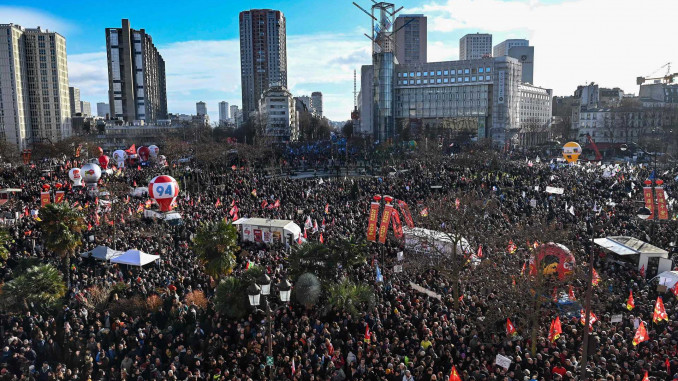
On Tuesday, Jan. 31 huge crowds took to the streets in the biggest nation-wide protest since 1995. This is the second day of mobilization to oppose President Emmanuel Macron’s plan to slash pensions by raising the minimum retirement age to 64 and increasing the pay-in period to 43 years. As of January 19, trains ground to a halt, and schools were empty. A third of railway workers joined the strike, and air traffic controllers participated enough to lead to delays and rescheduling. In Paris, 80% of public bus transportation was stopped and only two metro lines ran. The other major cities experienced public transportation strikes as well. In refineries and fuel depots 75% to 100% of the workers participated in the strike. Strikes also impacted auto, electrical service, and many small private workplaces. It was notable that many private sector workers struck along with the public sector workers.
Official figures put the number of demonstrators at 1.3 million, while the CGT union claimed there were 2.8 million. Overall, there were fewer strikers nationwide but more demonstrators. The impressive crowds in cities throughout the country were joyful assemblies, and they displayed both humor and anger on their banners and homemade posters. “We Won’t die for Capital”, “Retirement but by Arthritis”, “Increase Wages, not the Retirement Age”, “Down with retirement for the dead”, “Another world is possible URGENT.” Even in small towns, participation was very high. The day ended with the unions putting two more days of national mobilization on the calendar; Tuesday February 7 and Saturday, February 11. The Saturday is to allow those who cannot, or do not want, to strike to participate in the protest.
The working-class population is well aware that their life expectancy is lower than that of the wealthier population. Adding a couple of years to the job means cutting life short, and is unacceptable to the vast majority in France. The pension fund is not even bankrupt, and while Macron threatens that it could be, before the year 2030, this is a problem that can be solved simply by increasing wages, which leads to greater contributions to the pension fund.
These days of protest are giving a joyous boost to energy and morale. And they are undoubtedly a nightmare for President Macron. Pressure on him and his Prime Minister Borne is mounting, as the pension bill is coming up for debate in the lower house of Parliament. Macron only has a tenuous majority, with few allies. However, his government has the ability to pass this pension reform by skirting a vote in Parliament entirely, by using a tool in the constitution known as article 49.3, which has been used before to pass anti-labor legislation against the majority’s will.
Even after this massive day of protest, and with 71 percent of the population opposed to this “reform” (according to a poll by BFM-TV on Wednesday), Macron and Prime Minister Elizabeth Borne have reiterated that they are fully determined to move the age of retirement up to 64. On Thursday night, Borne insisted in a televised interview on France2’s “L’Evènement” program that “it is essential to carry out a reform to preserve our pension system by redistribution,” even if “asking the French to work progressively longer is not easy.”
Experience tells us that getting them to back down from a reform, that will put more money in the coffers of the rich, will require more than symbolic days of striking. Working people will have to hit the bosses where it hurts. For now, the workers involved in the movement haven’t felt the need to organize general assemblies, or strike committees, to direct the future of the protest movement, because the unions are calling these individual days of protest and strikes, which the majority of workers are thinking will suffice. But they will not suffice.
How to Impact profits, and Hit Macron and Business Where it Hurts?
To make it hurt for Macron’s real supporters – the employers in big business – these strikes need to become more sustained and generalized. Here and there, rarely, have there been renewable strikes, redecided daily by a workers’ strike committee. When this spreads, and if there is to be a general strike, Macron will be forced to back down. As the mobilizations for February 7 and 11 are being prepared, this is the perspective of revolutionary socialists in France in the New Anticapitalist Party and Lutte Ouvriere (Workers’ Struggle).




